
metta
A reinforcement learning codebase focusing on the emergence of cooperation and alignment in multi-agent AI systems.
Stars: 102
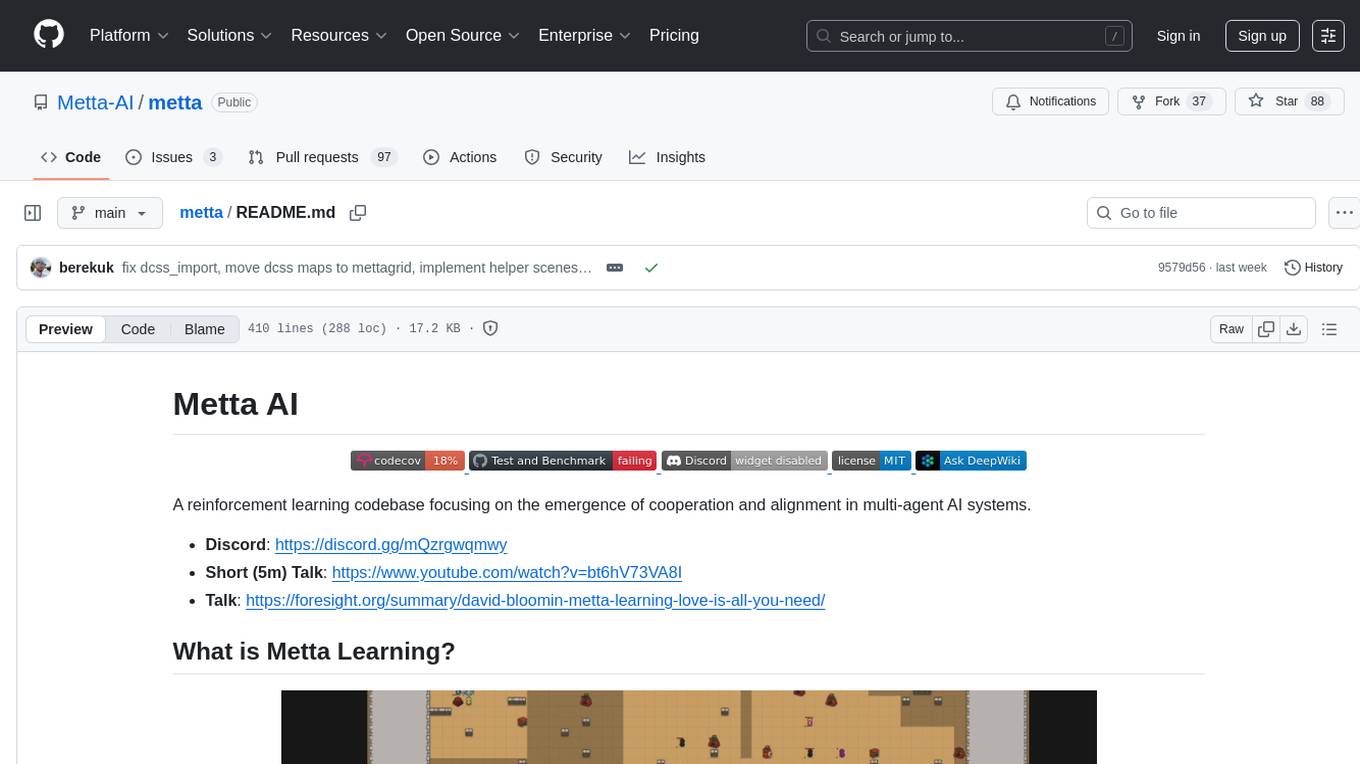
Metta AI is an open-source research project focusing on the emergence of cooperation and alignment in multi-agent AI systems. It explores the impact of social dynamics like kinship and mate selection on learning and cooperative behaviors of AI agents. The project introduces a reward-sharing mechanism mimicking familial bonds and mate selection to observe the evolution of complex social behaviors among AI agents. Metta aims to contribute to the discussion on safe and beneficial AGI by creating an environment where AI agents can develop general intelligence through continuous learning and adaptation.
README:
A reinforcement learning codebase focusing on the emergence of cooperation and alignment in multi-agent AI systems.
- Discord: https://discord.gg/mQzrgwqmwy
- Short (5m) Talk: https://www.youtube.com/watch?v=bt6hV73VA8I
- Talk: https://foresight.org/summary/david-bloomin-metta-learning-love-is-all-you-need/
Metta AI is an open-source research project investigating the emergence of cooperation and alignment in multi-agent AI systems. By creating a model organism for complex multi-agent gridworld environments, the project aims to study the impact of social dynamics, such as kinship and mate selection, on learning and cooperative behaviors of AI agents.
Metta AI explores the hypothesis that social dynamics, akin to love in biological systems, play a crucial role in the development of cooperative AGI and AI alignment. The project introduces a novel reward-sharing mechanism mimicking familial bonds and mate selection, allowing researchers to observe the evolution of complex social behaviors and cooperation among AI agents. By investigating this concept in a controlled multi-agent setting, the project seeks to contribute to the broader discussion on the path towards safe and beneficial AGI.
Metta is a simulation environment (game) designed to train AI agents capable of meta-learning general intelligence. The core idea is to create an environment where incremental intelligence is rewarded, fostering the development of generally intelligent agents.
-
Agents and Environment: Agents are shaped by their environment, learning policies that enhance their fitness. To develop general intelligence, agents need an environment where increasing intelligence is continually rewarded.
-
Competitive and Cooperative Dynamics: A game with multiple agents and some competition creates an evolving environment where challenges increase with agent intelligence. Purely competitive games often reach a Nash equilibrium, where locally optimal strategies are hard to deviate from. Adding cooperative dynamics introduces more behavioral possibilities and smooths the behavioral space.
-
Kinship Structures: The game features a flexible kinship structure, simulating a range of relationships from close kin to strangers. Agents must learn to coordinate with close kin, negotiate with more distant kin, and compete with strangers. This diverse social environment encourages continuous learning and intelligence growth.
The game is designed to evolve with the agents, providing unlimited learning opportunities despite simple rules.
The current version of the game can be found here. It's a grid world with the following dynamics:
- Agents and Vision: Agents can see a limited number of squares around them.
- Resources: Agents harvest diamonds, convert them to energy at charger stations, and use energy to power the "heart altar" for rewards.
- Energy Management: All actions cost energy, so agents learn to manage their energy budgets efficiently.
- Combat: Agents can attack others, temporarily freezing the target and stealing resources.
- Defense: Agents can toggle shields, which drain energy but absorb attacks.
- Cooperation: Agents can share energy or resources and use markers to communicate.
The game offers numerous possibilities for exploration, including:
- Diverse Energy Profiles: Assigning different energy profiles to agents, essentially giving them different bodies and policies.
- Dynamic Energy Profiles: Allowing agents to change their energy profiles, reflecting different postures or emotions.
- Resource Types and Conversions: Introducing different resource types and conversion mechanisms.
- Environment Modification: Enabling agents to modify the game board by creating, destroying, or altering objects.
The game explores various kinship structures:
- Random Kinship Scores: Each pair of agents has a kinship score sampled from a distribution.
- Teams: Agents belong to teams with symmetric kinship among team members.
- Hives/Clans/Families: Structuring agents into larger kinship groups.
Future plans include incorporating mate-selection dynamics, where agents share future rewards at a cost, potentially leading to intelligence gains through a signaling arms race.
Metta aims to create a rich, evolving environment where AI agents can develop general intelligence through continuous learning and adaptation.
The project's modular design and open-source nature make it easy for researchers to adapt and extend the platform to investigate their own hypotheses in this domain. The highly performant, open-ended game rules provide a rich environment for studying these behaviors and their potential implications for AI alignment.
Some areas of research interest:
Develop rich and diverse gridworld environments with complex dynamics, such as resource systems, agent diversity, procedural terrain generation, support for various environment types, population dynamics, and kinship schemes.
Incorporate techniques like dense learning signals, surprise minimization, exploration strategies, and blending reinforcement and imitation learning.
Investigate scalable training approaches, including distributed reinforcement learning, student-teacher architectures, and blending reinforcement learning with imitation learning, to enable efficient training of large-scale multi-agent systems.
Design and implement a comprehensive suite of intelligence evaluations for gridworld agents, covering navigation tasks, maze solving, in-context learning, cooperation, and competition scenarios.
Develop tools and infrastructure for efficient management, tracking, and deployment of experiments, such as cloud cluster management, experiment tracking and visualization, and continuous integration and deployment pipelines.
This README provides only a brief overview of research explorations. Visit the research roadmap for more details.
Clone the repository and run the setup:
git clone https://github.com/Metta-AI/metta.git
cd metta
./install.sh # Interactive setup - installs uv, configures metta, and installs componentsAfter installation, you can use metta commands directly:
metta status # Check component status
metta install # Install additional components
metta configure # Reconfigure for a different profile./install.sh --profile softmax # For Softmax employees
./install.sh --profile external # For external collaborators
./install.sh --help # Show all available options
The repository contains command-line tools in the tools/ directory.
run.py is a script that kicks off tasks like training, evaluation, and visualization. The runner looks up the task,
builds its configuration, and runs it. The current available tasks are:
-
experiments.recipes.arena.train: Train on the arena curriculum
./tools/run.py experiments.recipes.arena.train run=my_experiment -
experiments.recipes.navigation.train: Train on the navigation curriculum
./tools/run.py experiments.recipes.navigation.train run=my_experiment -
experiments.recipes.arena.play: Play in the browser
./tools/run.py experiments.recipes.arena.play -
experiments.recipes.arena.replay: Replay a single episode from a saved policy
./tools/run.py experiments.recipes.arena.replay policy_uri=s3://my-bucket/checkpoints/local.alice.1/local.alice.1:v10.pt -
experiments.recipes.arena.evaluate: Evaluate a policy on the arena eval suite
./tools/run.py experiments.recipes.arena.evaluate policy_uri=s3://my-bucket/checkpoints/local.alice.1/local.alice.1:v10.pt
Use the runner like this:
./tools/run.py <task_name> [key=value ...] [--verbose]The runner automatically classifies arguments:
- Function arguments: Arguments that match parameters of your task function
- Configuration overrides: Arguments that match fields in the Tool configuration (supports nested paths with dots)
Examples:
# The runner automatically identifies 'run' as a function arg and the rest as overrides
./tools/run.py experiments.recipes.arena.train run=local.alice.1 \
system.device=cpu wandb.enabled=false trainer.total_timesteps=100000
# Evaluate a specific policy URI
./tools/run.py experiments.recipes.arena.evaluate policy_uri=s3://my-bucket/checkpoints/local.alice.1/local.alice.1:v10.pt
# Use --verbose to see how arguments are classified
./tools/run.py experiments.recipes.arena.train run=test --verboseTips:
- Strings with spaces: quote the value, for example
notes="my local run". - Booleans are lowercase:
trueandfalse. - If a value looks numeric but should be a string, wrap it in quotes (for example,
run="001").
A “task” is just a Python function (or class) that returns a Tool configuration. The runner loads it by name and runs
its invoke() method.
What you write:
- A function that returns a Tool, for example
TrainTool,SimTool,PlayTool, orReplayTool. - Place it anywhere importable (for personal use,
experiments/user/<your_file>.pyis convenient). - The function name becomes part of the task name you run.
Minimal example:
# experiments/user/my_tasks.py
from metta.rl.training import EvaluatorConfig, TrainingEnvironmentConfig
from mettagrid.config.envs import make_arena
from metta.sim.simulation_config import SimulationConfig
from metta.tools.train import TrainTool
from mettagrid.builder.envs import make_arena
def my_train() -> TrainTool:
return TrainTool(
training_env=TrainingEnvironmentConfig(),
evaluator=EvaluatorConfig(
simulations=[
SimulationConfig(
suite="arena", name="arena/basic", env=make_arena(num_agents=6)
)
]
),
)Run your task:
./tools/run.py experiments.user.my_tasks.my_train run=local.me.1 system.device=cpu wandb.enabled=falseNotes:
- Tasks can also be Tool classes (subclasses of
metta.common.tool.Tool) - The runner automatically determines which arguments go to the function vs configuration overrides
- Use
--verboseto see how arguments are being classified - If an argument doesn't match either category, you'll get a helpful error message
To use WandB with your personal account:
- Get your WandB API key from wandb.ai (click your profile → API keys)
- Add it to your
~/.netrcfile:machine api.wandb.ai login user password YOUR_API_KEY_HERE - Edit
configs/wandb/external_user.yamland replace???with your WandB username:entity: ??? # Replace with your WandB username
Now you can run training with your personal WandB config:
./tools/run.py experiments.recipes.arena.train run=local.yourname.123 wandb.enabled=true wandb.entity=<your_user>
Mettascope allows you to run and view episodes in the environment you specify. It goes beyond just spectator mode, and allows taking over an agent and controlling it manually.
For more information, see ./mettascope/README.md.
./tools/run.py experiments.recipes.arena.playOptional overrides:
-
policy_uri=<path>: Use a specific policy for NPC agents.- Local checkpoints:
file://./train_dir/<run>/checkpoints/<run>:v{epoch}.pt
- Local checkpoints:
- S3 checkpoints:
s3://bucket/path/<run_name>/checkpoints/<run_name>:v5.pt
./tools/run.py experiments.recipes.arena.replay policy_uri=s3://my-bucket/checkpoints/local.alice.1/local.alice.1:v10.pt
When you run training, if you have WandB enabled, then you will be able to see in your WandB run page results for the eval suites.
However, this will not apply for anything trained before April 8th.
If you want to run evaluation post-training to compare different policies, you can do the following:
Evaluate a policy against the arena eval suite:
./tools/run.py experiments.recipes.arena.evaluate policy_uri=s3://my-bucket/checkpoints/local.alice.1/local.alice.1:v10.pt
Evaluate on the navigation eval suite (provide the policy URI):
./tools/run.py experiments.recipes.navigation.eval policy_uris=s3://my-bucket/checkpoints/local.alice.1/local.alice.1:v10.pt
This repo implements a MettaAgent policy class. By default we now build policies using the ViT-based
ViTDefaultConfig (defined in metta.agent.policies.vit). Policy architectures are now expressed as Python configs in
metta.agent.policies, replacing the legacy configs/agent/*.yaml files referenced in older docs. See
metta.agent.policies.vit for a concrete example and consult the
agent-architecture wiki for conceptual documentation.
To use MettaAgent with a non-default architecture config:
- (Optional): Implement your own
PolicyArchitecturesubclass (for example by copyingViTDefaultConfigintometta/agent/policies/my_agent.py). - Run with the configuration file of your choice:
./tools/run.py experiments.recipes.arena.train policy_architecture.agent_config=my_agent
We support agent architectures without using the MettaAgent system:
- Implement your agent class under
metta/agent/src/metta/agent/pytorch/my_agent.py. Seemetta/agent/src/metta/agent/pytorch/fast.pyfor an example. - Register it in
metta/agent/src/metta/agent/agent_config.pyby adding an entry toAGENT_REGISTRYwith a key name (e.g.,"my_agent"). - Select it at runtime using the runner and an override on the agent config name:
./tools/run.py experiments.recipes.arena.train policy_architecture.name=pytorch/my_agent
Further updates to support bringing your own agent are coming soon.
To run the style checks and tests locally:
ruff format
ruff check
pyright metta # optional, some stubs are missing
pytest| Task | Command |
|---|---|
| Train (arena) | ./tools/run.py experiments.recipes.arena.train run=my_experiment |
| Train (navigation) | ./tools/run.py experiments.recipes.navigation.train run=my_experiment |
| Play (browser) | ./tools/run.py experiments.recipes.arena.play |
| Replay (policy) | ./tools/run.py experiments.recipes.arena.replay policy_uri=s3://my-bucket/checkpoints/local.alice.1/local.alice.1:v10.pt |
| Evaluate (arena) | ./tools/run.py experiments.recipes.arena.evaluate policy_uri=s3://my-bucket/checkpoints/local.alice.1/local.alice.1:v10.pt |
| Evaluate (navigation suite) | ./tools/run.py experiments.recipes.navigation.eval policy_uris=s3://my-bucket/checkpoints/local.alice.1/local.alice.1:v10.pt |
Running these commands mirrors our CI configuration and helps keep the codebase consistent.
For Tasks:
Click tags to check more tools for each tasksFor Jobs:
Alternative AI tools for metta
Similar Open Source Tools

metta
Metta AI is an open-source research project focusing on the emergence of cooperation and alignment in multi-agent AI systems. It explores the impact of social dynamics like kinship and mate selection on learning and cooperative behaviors of AI agents. The project introduces a reward-sharing mechanism mimicking familial bonds and mate selection to observe the evolution of complex social behaviors among AI agents. Metta aims to contribute to the discussion on safe and beneficial AGI by creating an environment where AI agents can develop general intelligence through continuous learning and adaptation.
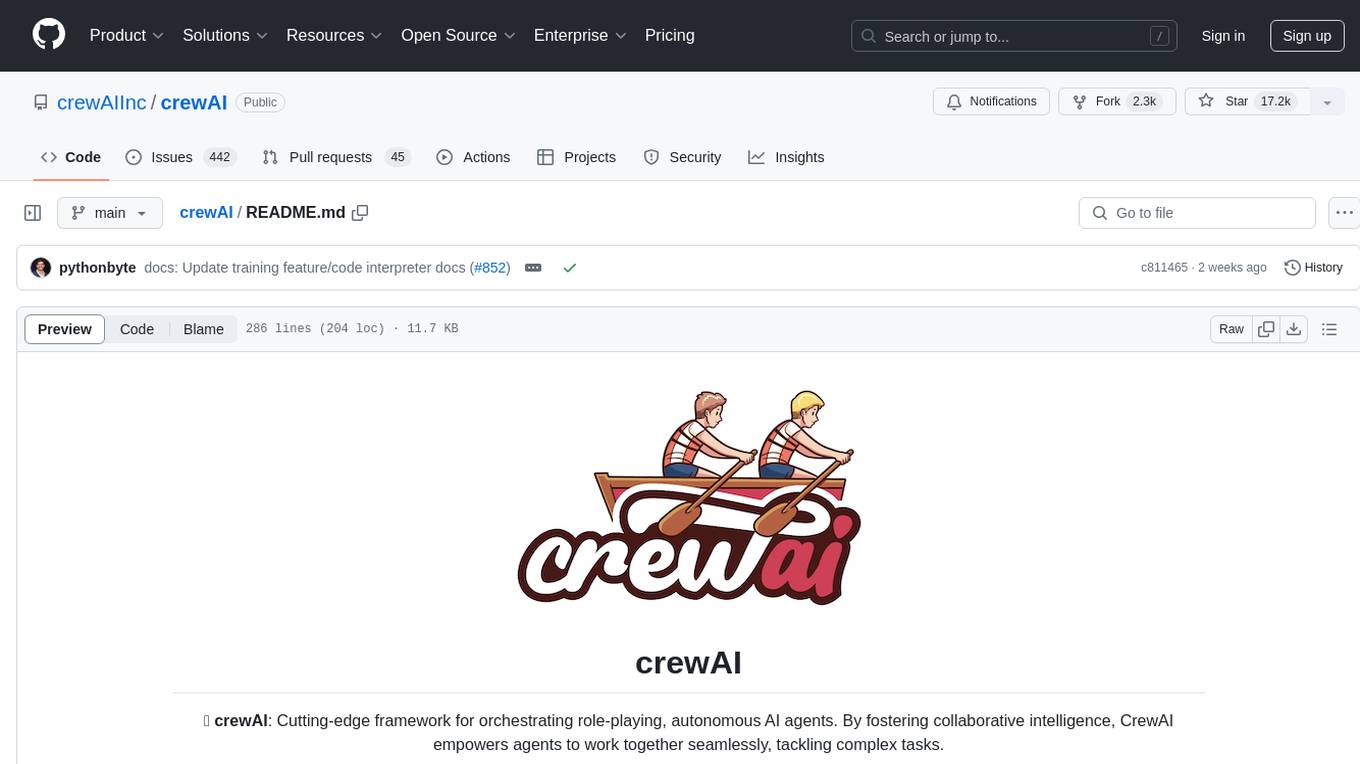
crewAI
CrewAI is a cutting-edge framework designed to orchestrate role-playing autonomous AI agents. By fostering collaborative intelligence, CrewAI empowers agents to work together seamlessly, tackling complex tasks. It enables AI agents to assume roles, share goals, and operate in a cohesive unit, much like a well-oiled crew. Whether you're building a smart assistant platform, an automated customer service ensemble, or a multi-agent research team, CrewAI provides the backbone for sophisticated multi-agent interactions. With features like role-based agent design, autonomous inter-agent delegation, flexible task management, and support for various LLMs, CrewAI offers a dynamic and adaptable solution for both development and production workflows.
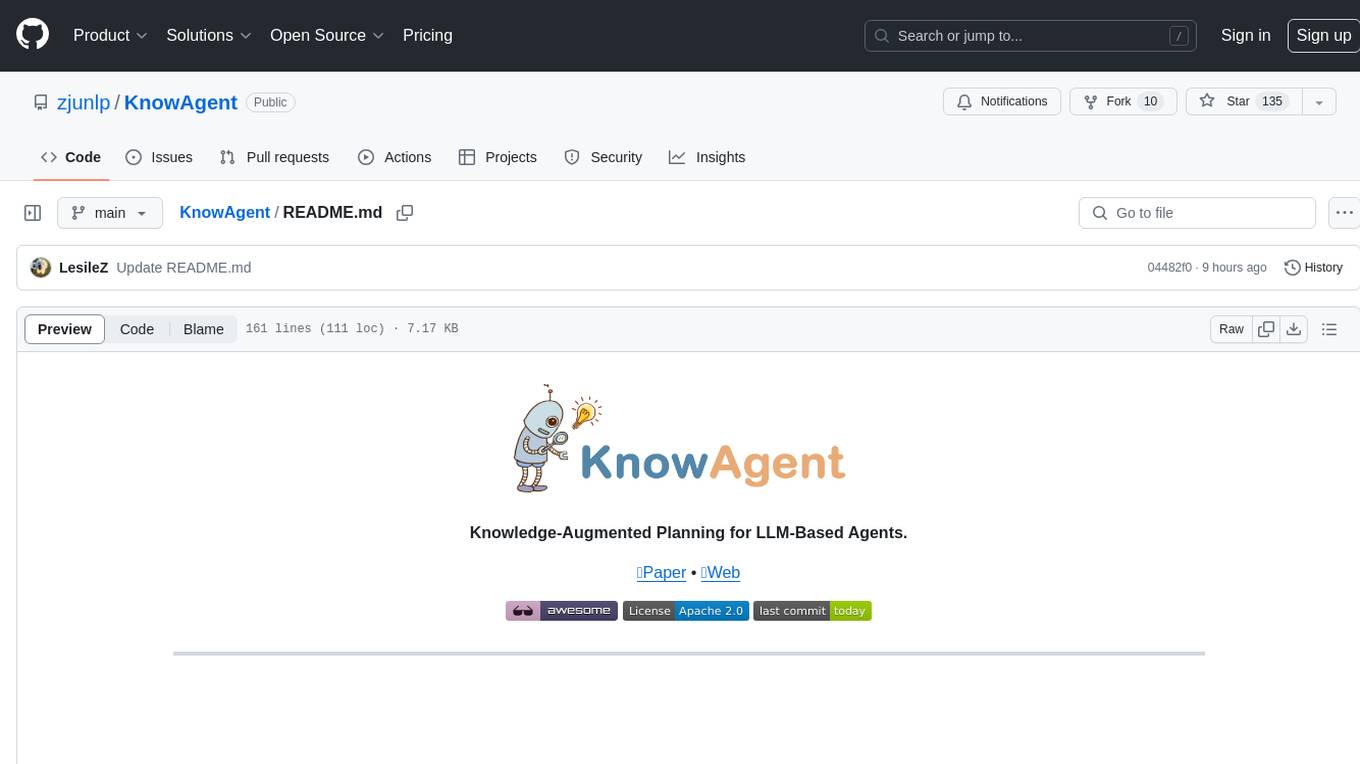
KnowAgent
KnowAgent is a tool designed for Knowledge-Augmented Planning for LLM-Based Agents. It involves creating an action knowledge base, converting action knowledge into text for model understanding, and a knowledgeable self-learning phase to continually improve the model's planning abilities. The tool aims to enhance agents' potential for application in complex situations by leveraging external reservoirs of information and iterative processes.
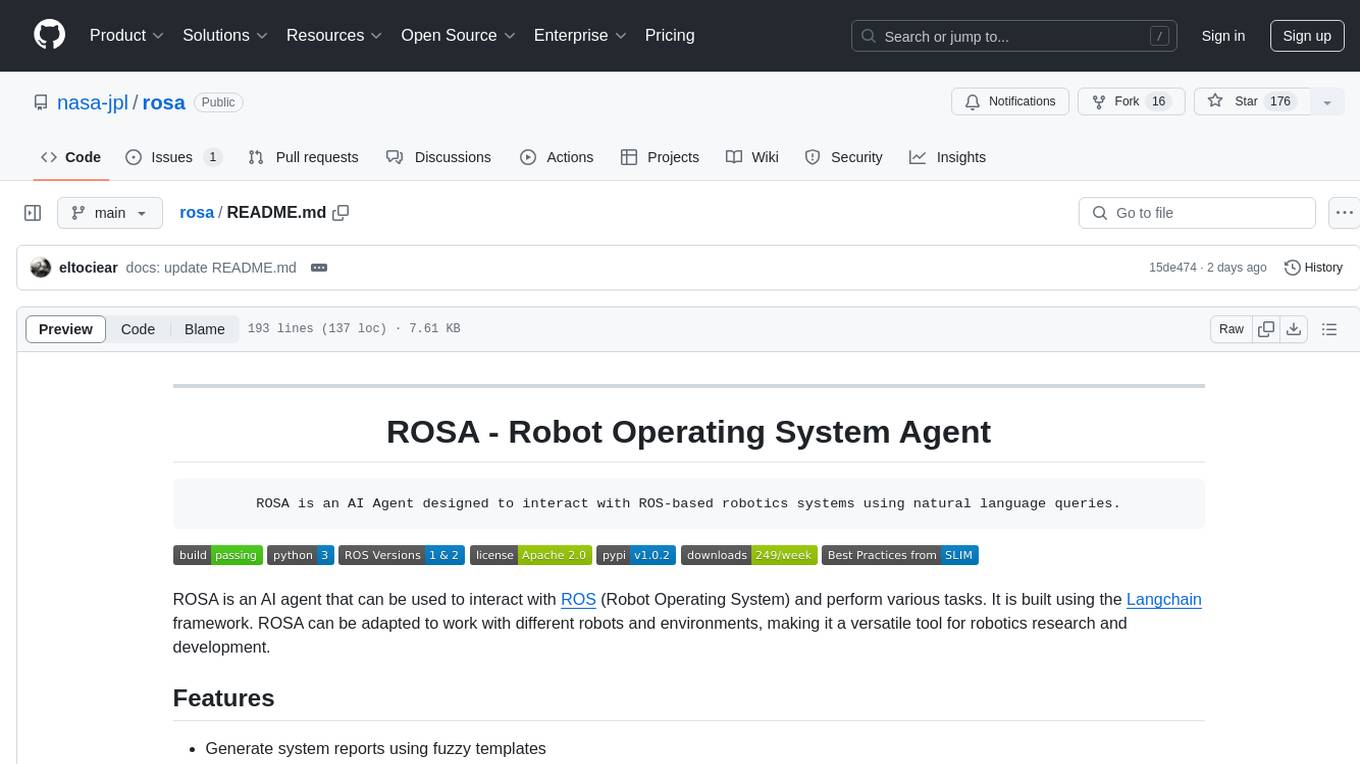
rosa
ROSA is an AI Agent designed to interact with ROS-based robotics systems using natural language queries. It can generate system reports, read and parse ROS log files, adapt to new robots, and run various ROS commands using natural language. The tool is versatile for robotics research and development, providing an easy way to interact with robots and the ROS environment.
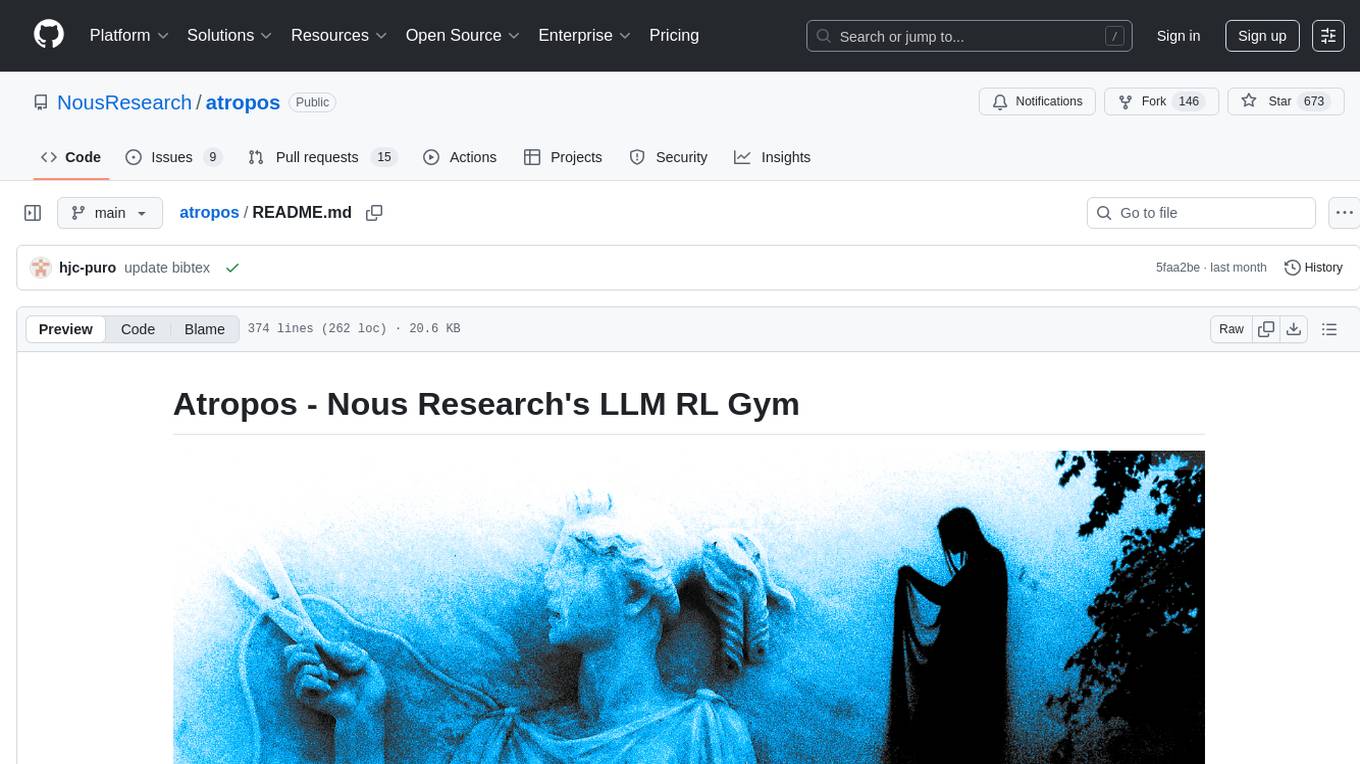
atropos
Atropos is a robust and scalable framework for Reinforcement Learning Environments with Large Language Models (LLMs). It provides a flexible platform to accelerate LLM-based RL research across diverse interactive settings. Atropos supports multi-turn and asynchronous RL interactions, integrates with various inference APIs, offers a standardized training interface for experimenting with different RL algorithms, and allows for easy scalability by launching more environment instances. The framework manages diverse environment types concurrently for heterogeneous, multi-modal training.

Biomni
Biomni is a general-purpose biomedical AI agent designed to autonomously execute a wide range of research tasks across diverse biomedical subfields. By integrating cutting-edge large language model (LLM) reasoning with retrieval-augmented planning and code-based execution, Biomni helps scientists dramatically enhance research productivity and generate testable hypotheses.
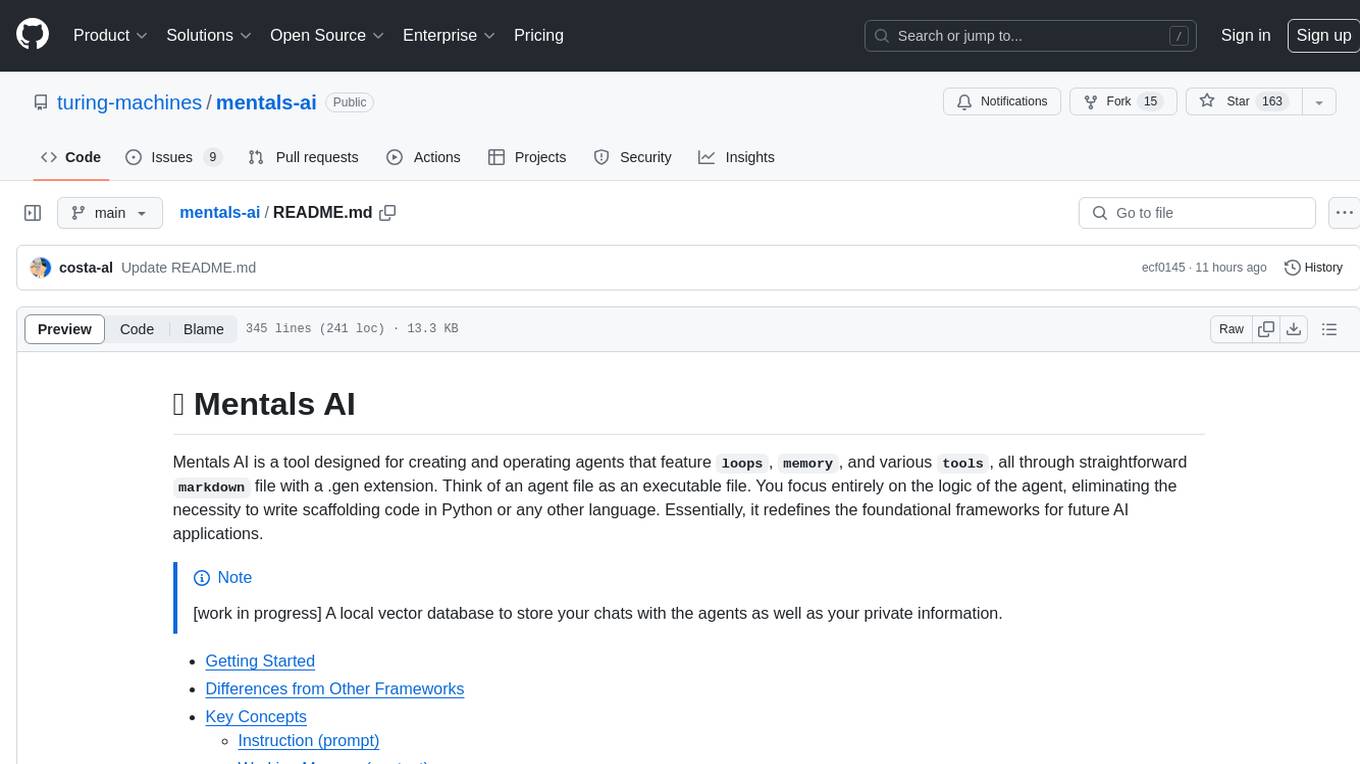
mentals-ai
Mentals AI is a tool designed for creating and operating agents that feature loops, memory, and various tools, all through straightforward markdown syntax. This tool enables you to concentrate solely on the agent’s logic, eliminating the necessity to compose underlying code in Python or any other language. It redefines the foundational frameworks for future AI applications by allowing the creation of agents with recursive decision-making processes, integration of reasoning frameworks, and control flow expressed in natural language. Key concepts include instructions with prompts and references, working memory for context, short-term memory for storing intermediate results, and control flow from strings to algorithms. The tool provides a set of native tools for message output, user input, file handling, Python interpreter, Bash commands, and short-term memory. The roadmap includes features like a web UI, vector database tools, agent's experience, and tools for image generation and browsing. The idea behind Mentals AI originated from studies on psychoanalysis executive functions and aims to integrate 'System 1' (cognitive executor) with 'System 2' (central executive) to create more sophisticated agents.
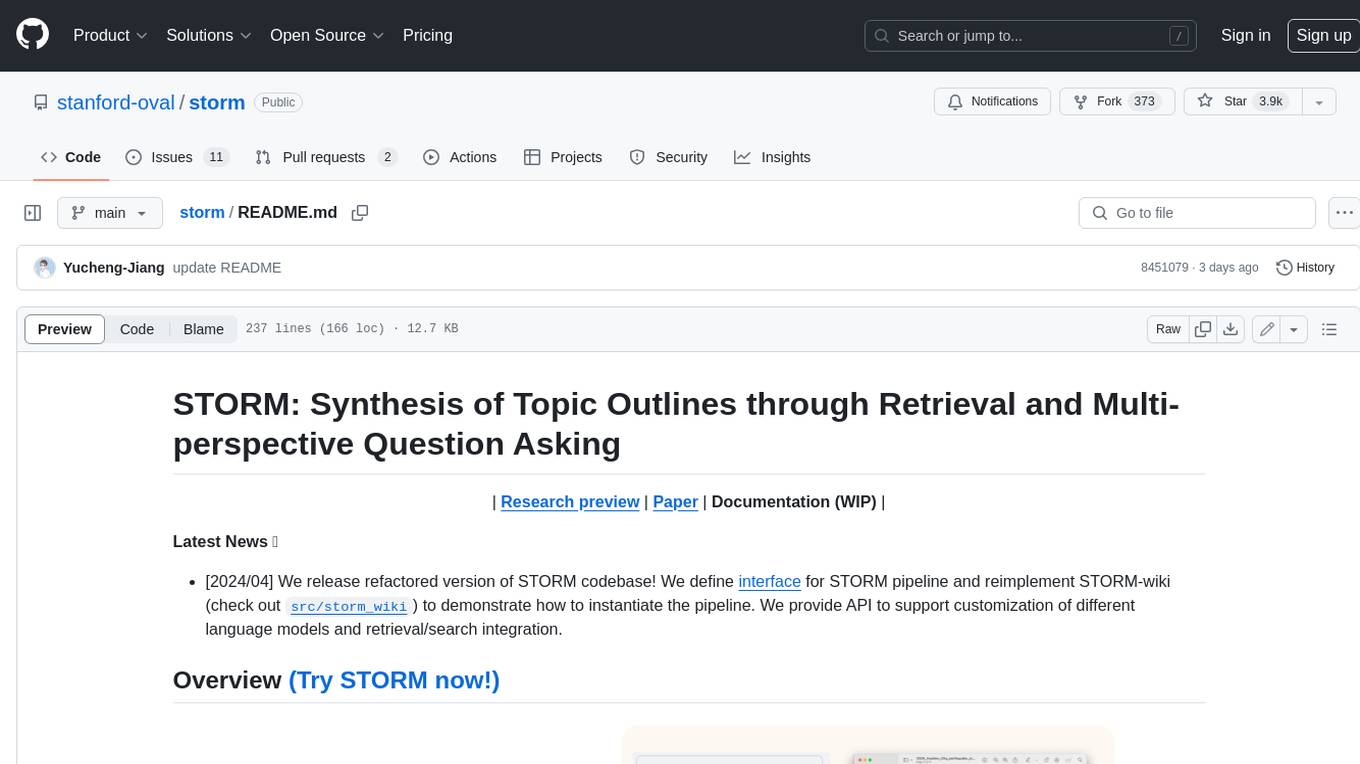
storm
STORM is a LLM system that writes Wikipedia-like articles from scratch based on Internet search. While the system cannot produce publication-ready articles that often require a significant number of edits, experienced Wikipedia editors have found it helpful in their pre-writing stage. **Try out our [live research preview](https://storm.genie.stanford.edu/) to see how STORM can help your knowledge exploration journey and please provide feedback to help us improve the system 🙏!**
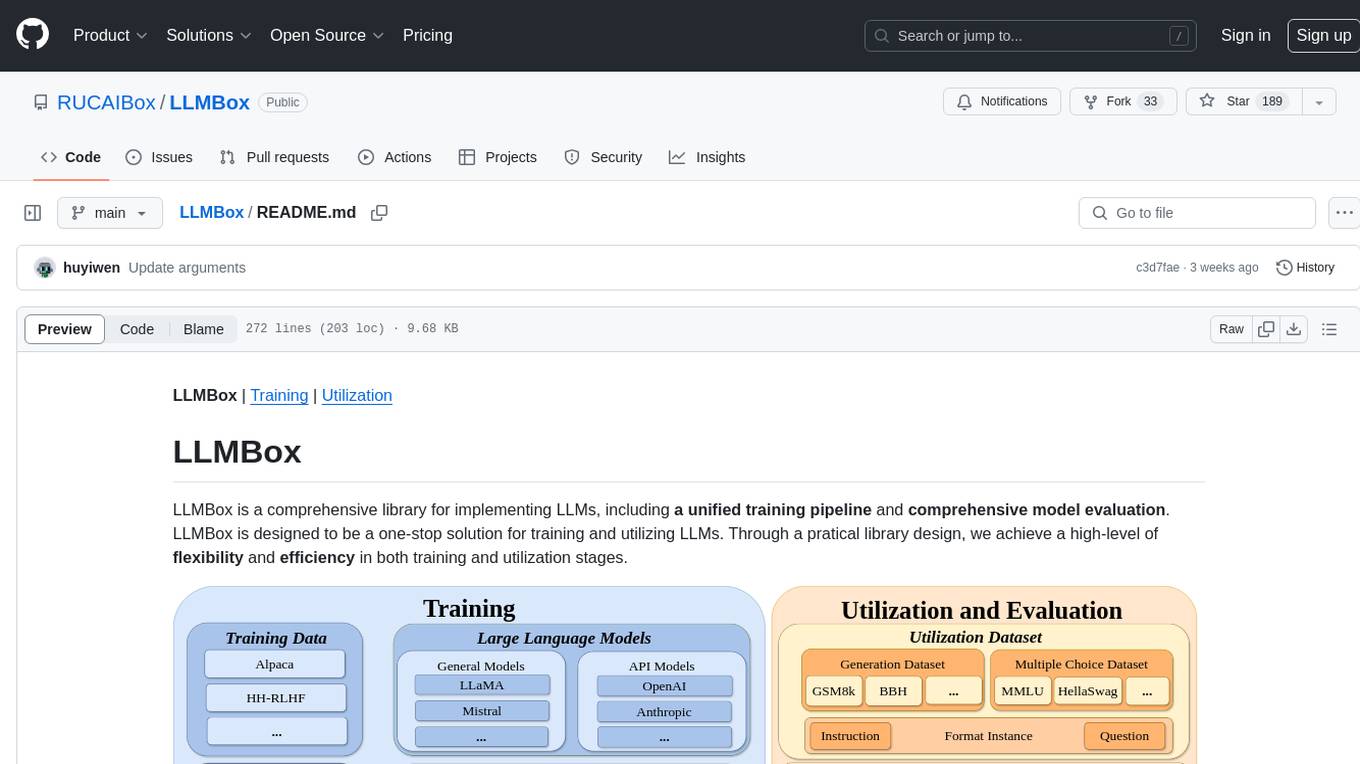
LLMBox
LLMBox is a comprehensive library designed for implementing Large Language Models (LLMs) with a focus on a unified training pipeline and comprehensive model evaluation. It serves as a one-stop solution for training and utilizing LLMs, offering flexibility and efficiency in both training and utilization stages. The library supports diverse training strategies, comprehensive datasets, tokenizer vocabulary merging, data construction strategies, parameter efficient fine-tuning, and efficient training methods. For utilization, LLMBox provides comprehensive evaluation on various datasets, in-context learning strategies, chain-of-thought evaluation, evaluation methods, prefix caching for faster inference, support for specific LLM models like vLLM and Flash Attention, and quantization options. The tool is suitable for researchers and developers working with LLMs for natural language processing tasks.
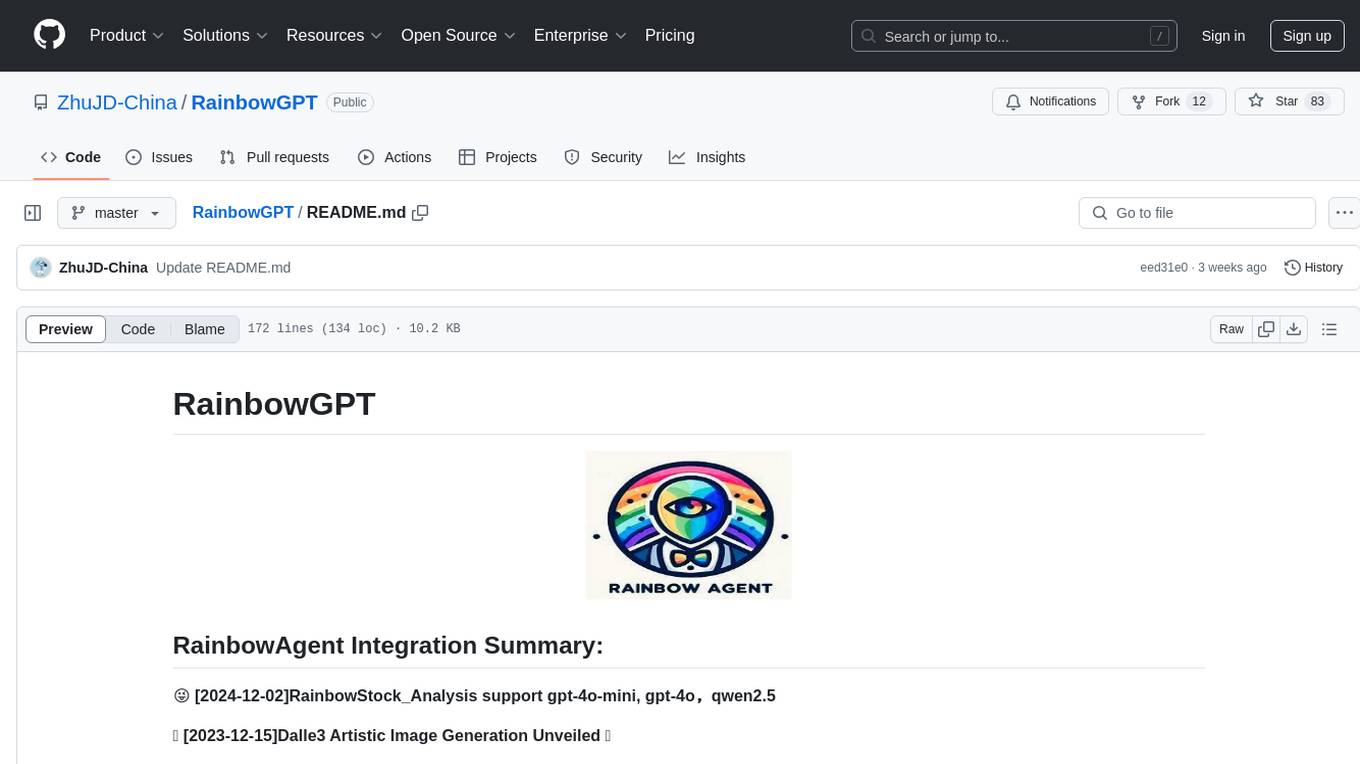
RainbowGPT
RainbowGPT is a versatile tool that offers a range of functionalities, including Stock Analysis for financial decision-making, MySQL Management for database navigation, and integration of AI technologies like GPT-4 and ChatGlm3. It provides a user-friendly interface suitable for all skill levels, ensuring seamless information flow and continuous expansion of emerging technologies. The tool enhances adaptability, creativity, and insight, making it a valuable asset for various projects and tasks.
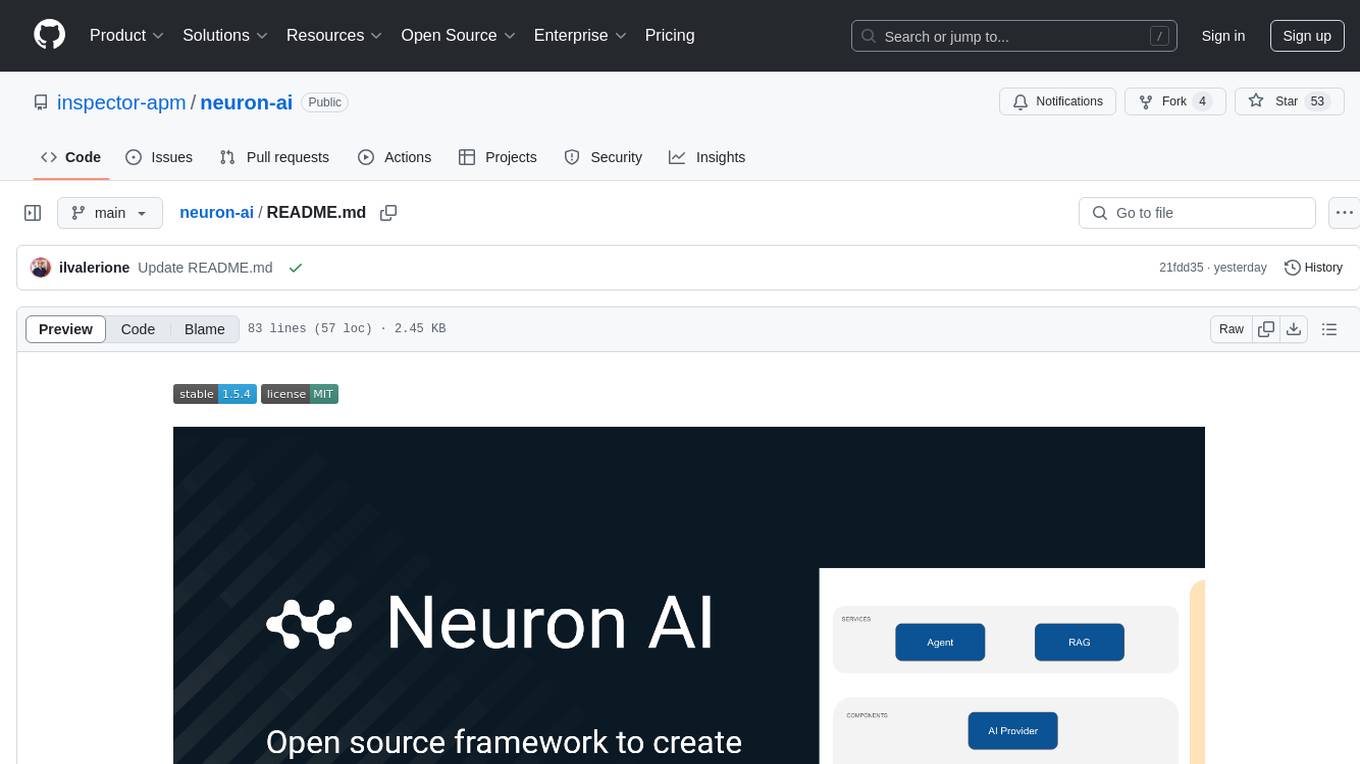
neuron-ai
Neuron AI is a PHP framework that provides an Agent class for creating fully functional agents to perform tasks like analyzing text for SEO optimization. The framework manages advanced mechanisms such as memory, tools, and function calls. Users can extend the Agent class to create custom agents and interact with them to get responses based on the underlying LLM. Neuron AI aims to simplify the development of AI-powered applications by offering a structured framework with documentation and guidelines for contributions under the MIT license.
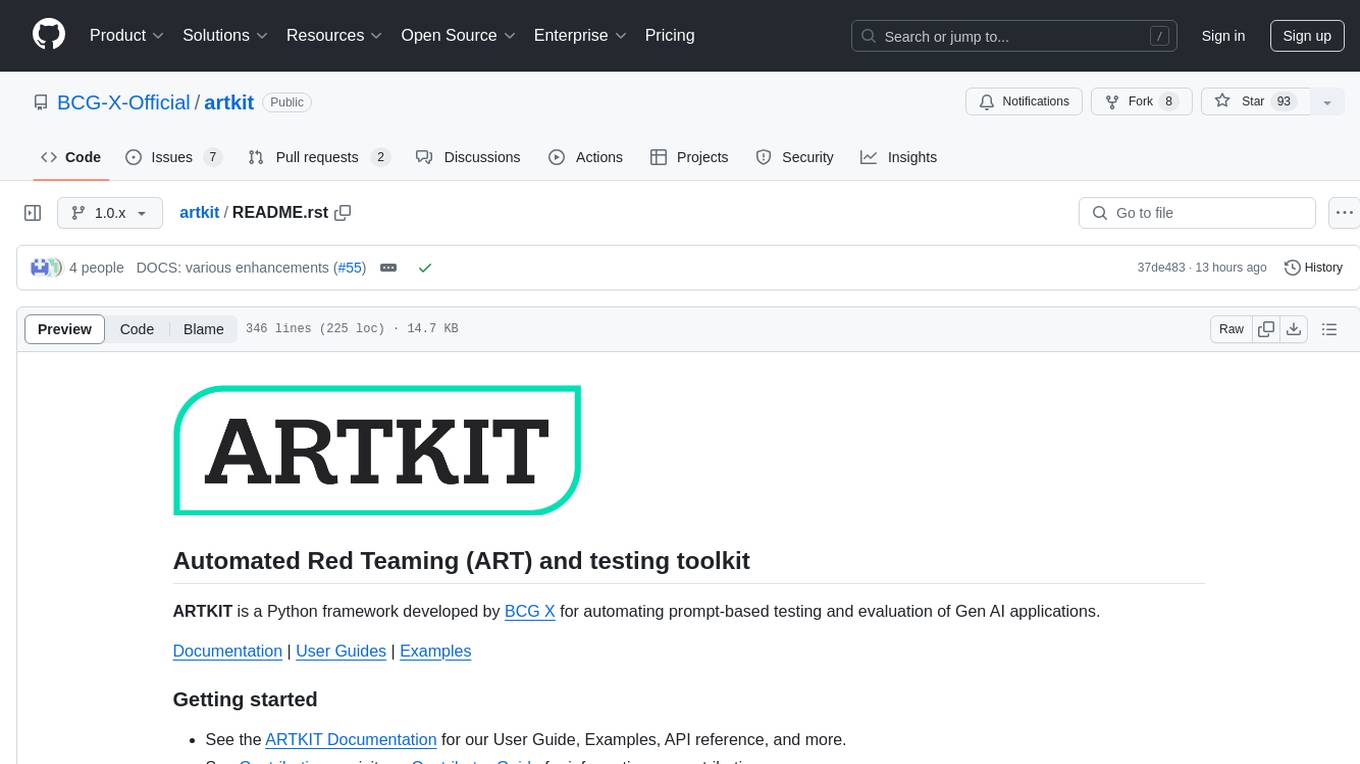
artkit
ARTKIT is a Python framework developed by BCG X for automating prompt-based testing and evaluation of Gen AI applications. It allows users to develop automated end-to-end testing and evaluation pipelines for Gen AI systems, supporting multi-turn conversations and various testing scenarios like Q&A accuracy, brand values, equitability, safety, and security. The framework provides a simple API, asynchronous processing, caching, model agnostic support, end-to-end pipelines, multi-turn conversations, robust data flows, and visualizations. ARTKIT is designed for customization by data scientists and engineers to enhance human-in-the-loop testing and evaluation, emphasizing the importance of tailored testing for each Gen AI use case.

deep-research
Deep Research is a lightning-fast tool that uses powerful AI models to generate comprehensive research reports in just a few minutes. It leverages advanced 'Thinking' and 'Task' models, combined with an internet connection, to provide fast and insightful analysis on various topics. The tool ensures privacy by processing and storing all data locally. It supports multi-platform deployment, offers support for various large language models, web search functionality, knowledge graph generation, research history preservation, local and server API support, PWA technology, multi-key payload support, multi-language support, and is built with modern technologies like Next.js and Shadcn UI. Deep Research is open-source under the MIT License.
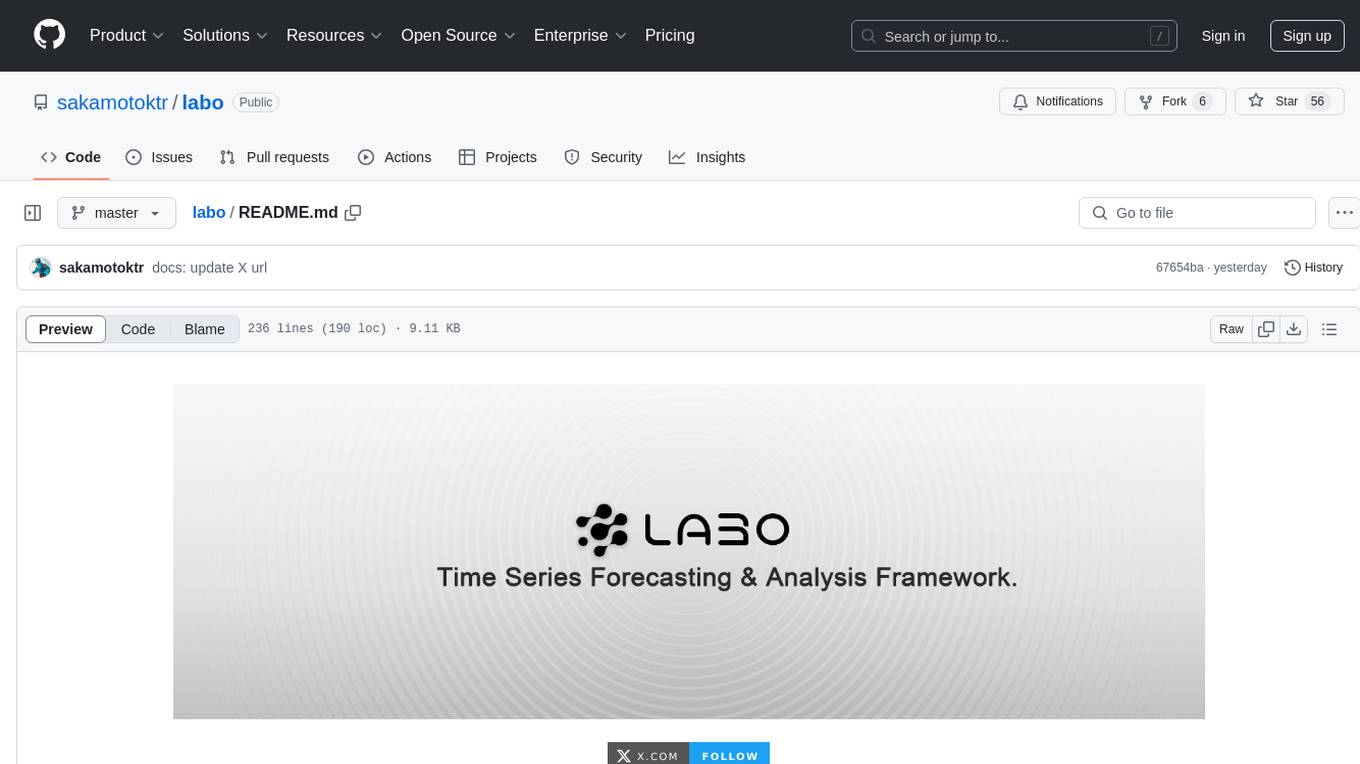
labo
LABO is a time series forecasting and analysis framework that integrates pre-trained and fine-tuned LLMs with multi-domain agent-based systems. It allows users to create and tune agents easily for various scenarios, such as stock market trend prediction and web public opinion analysis. LABO requires a specific runtime environment setup, including system requirements, Python environment, dependency installations, and configurations. Users can fine-tune their own models using LABO's Low-Rank Adaptation (LoRA) for computational efficiency and continuous model updates. Additionally, LABO provides a Python library for building model training pipelines and customizing agents for specific tasks.
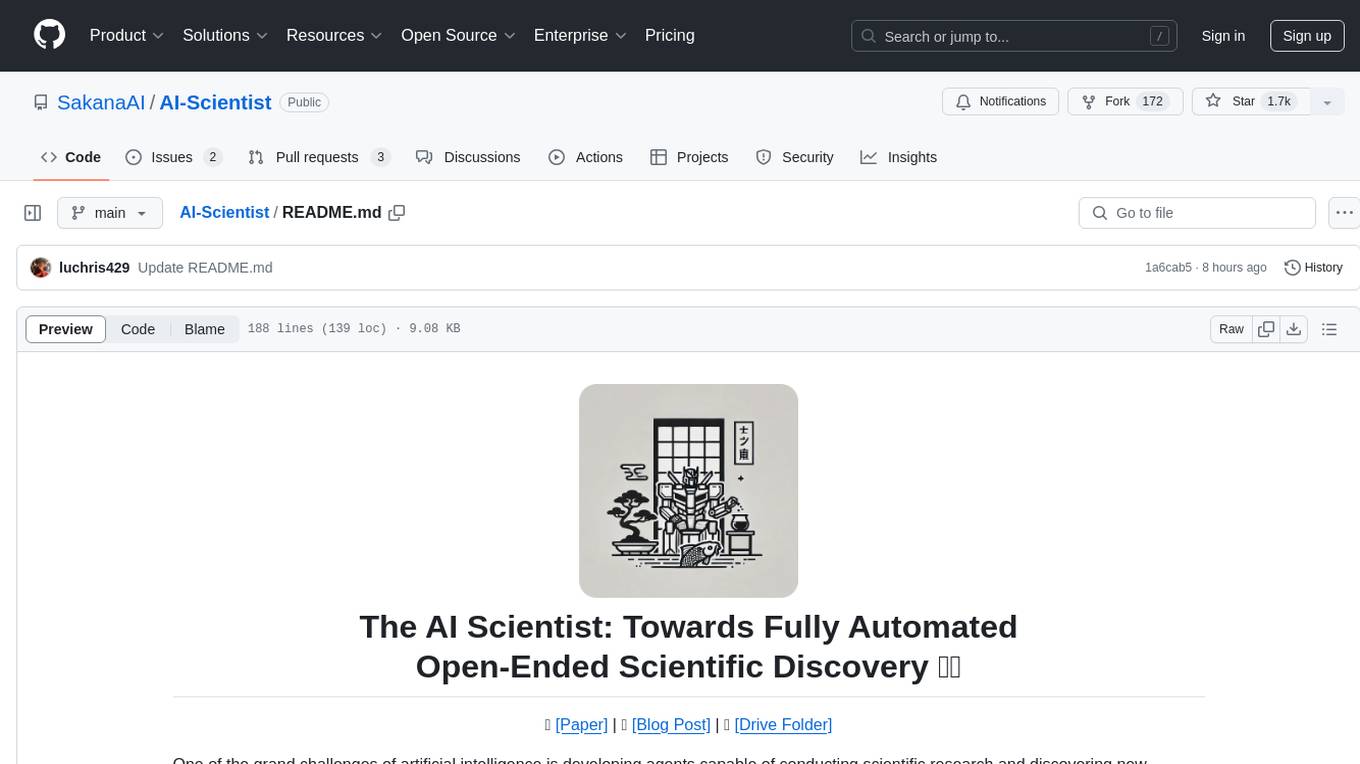
AI-Scientist
The AI Scientist is a comprehensive system for fully automatic scientific discovery, enabling Foundation Models to perform research independently. It aims to tackle the grand challenge of developing agents capable of conducting scientific research and discovering new knowledge. The tool generates papers on various topics using Large Language Models (LLMs) and provides a platform for exploring new research ideas. Users can create their own templates for specific areas of study and run experiments to generate papers. However, caution is advised as the codebase executes LLM-written code, which may pose risks such as the use of potentially dangerous packages and web access.
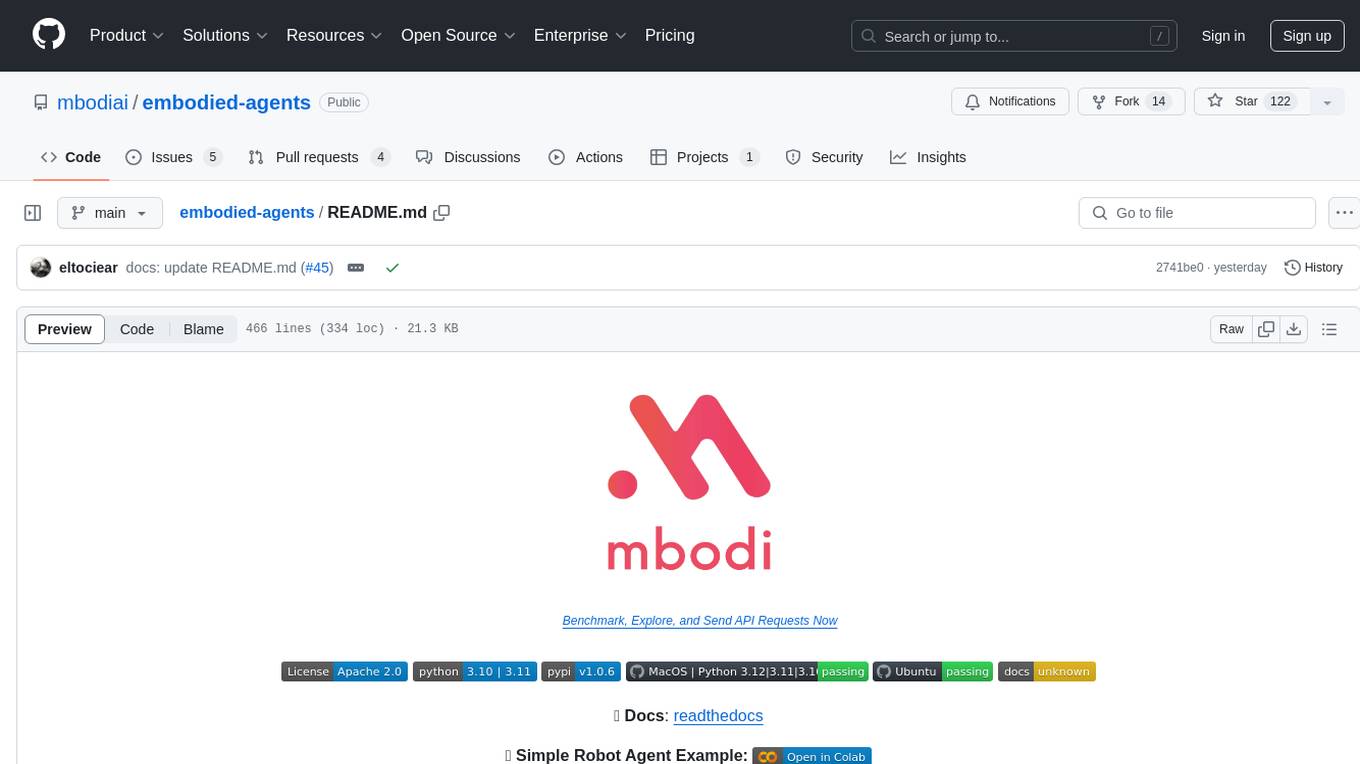
embodied-agents
Embodied Agents is a toolkit for integrating large multi-modal models into existing robot stacks with just a few lines of code. It provides consistency, reliability, scalability, and is configurable to any observation and action space. The toolkit is designed to reduce complexities involved in setting up inference endpoints, converting between different model formats, and collecting/storing datasets. It aims to facilitate data collection and sharing among roboticists by providing Python-first abstractions that are modular, extensible, and applicable to a wide range of tasks. The toolkit supports asynchronous and remote thread-safe agent execution for maximal responsiveness and scalability, and is compatible with various APIs like HuggingFace Spaces, Datasets, Gymnasium Spaces, Ollama, and OpenAI. It also offers automatic dataset recording and optional uploads to the HuggingFace hub.
For similar tasks

metta
Metta AI is an open-source research project focusing on the emergence of cooperation and alignment in multi-agent AI systems. It explores the impact of social dynamics like kinship and mate selection on learning and cooperative behaviors of AI agents. The project introduces a reward-sharing mechanism mimicking familial bonds and mate selection to observe the evolution of complex social behaviors among AI agents. Metta aims to contribute to the discussion on safe and beneficial AGI by creating an environment where AI agents can develop general intelligence through continuous learning and adaptation.
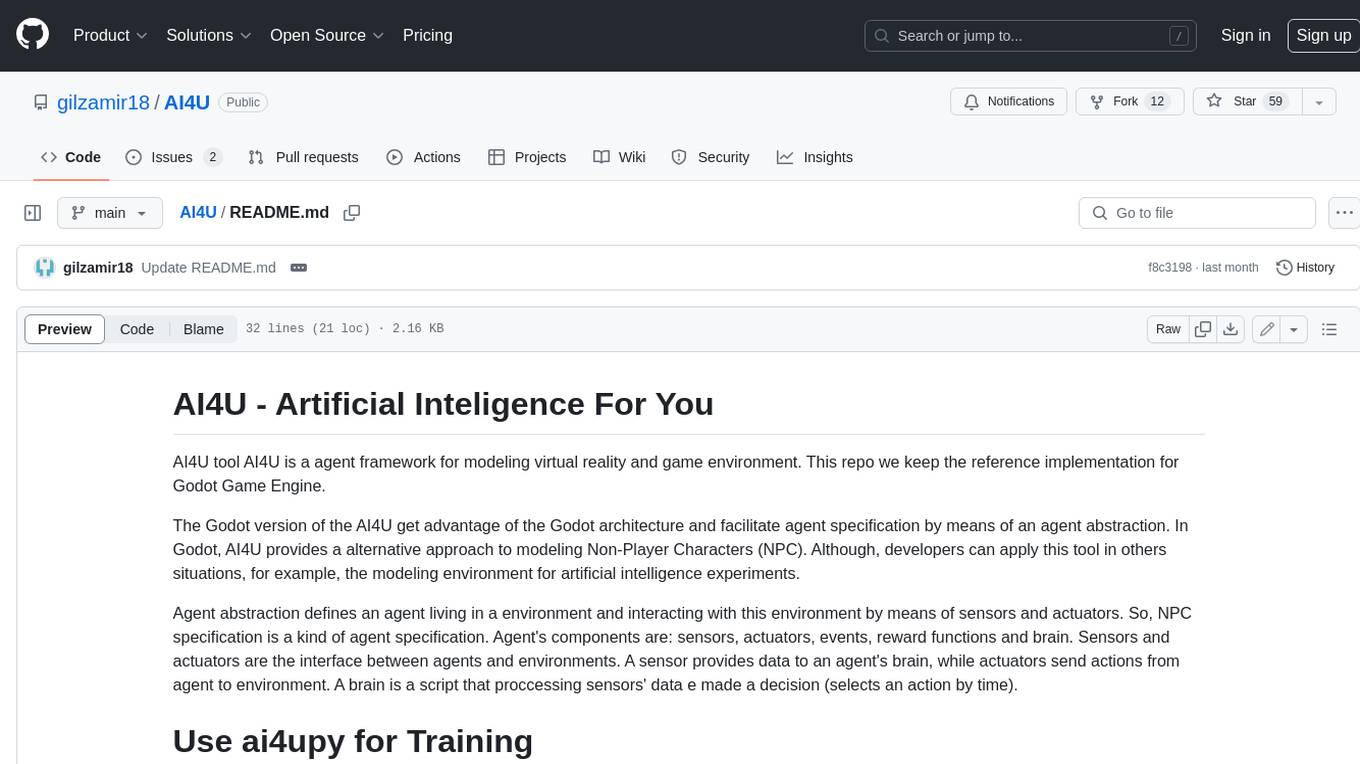
AI4U
AI4U is a tool that provides a framework for modeling virtual reality and game environments. It offers an alternative approach to modeling Non-Player Characters (NPCs) in Godot Game Engine. AI4U defines an agent living in an environment and interacting with it through sensors and actuators. Sensors provide data to the agent's brain, while actuators send actions from the agent to the environment. The brain processes the sensor data and makes decisions (selects an action by time). AI4U can also be used in other situations, such as modeling environments for artificial intelligence experiments.
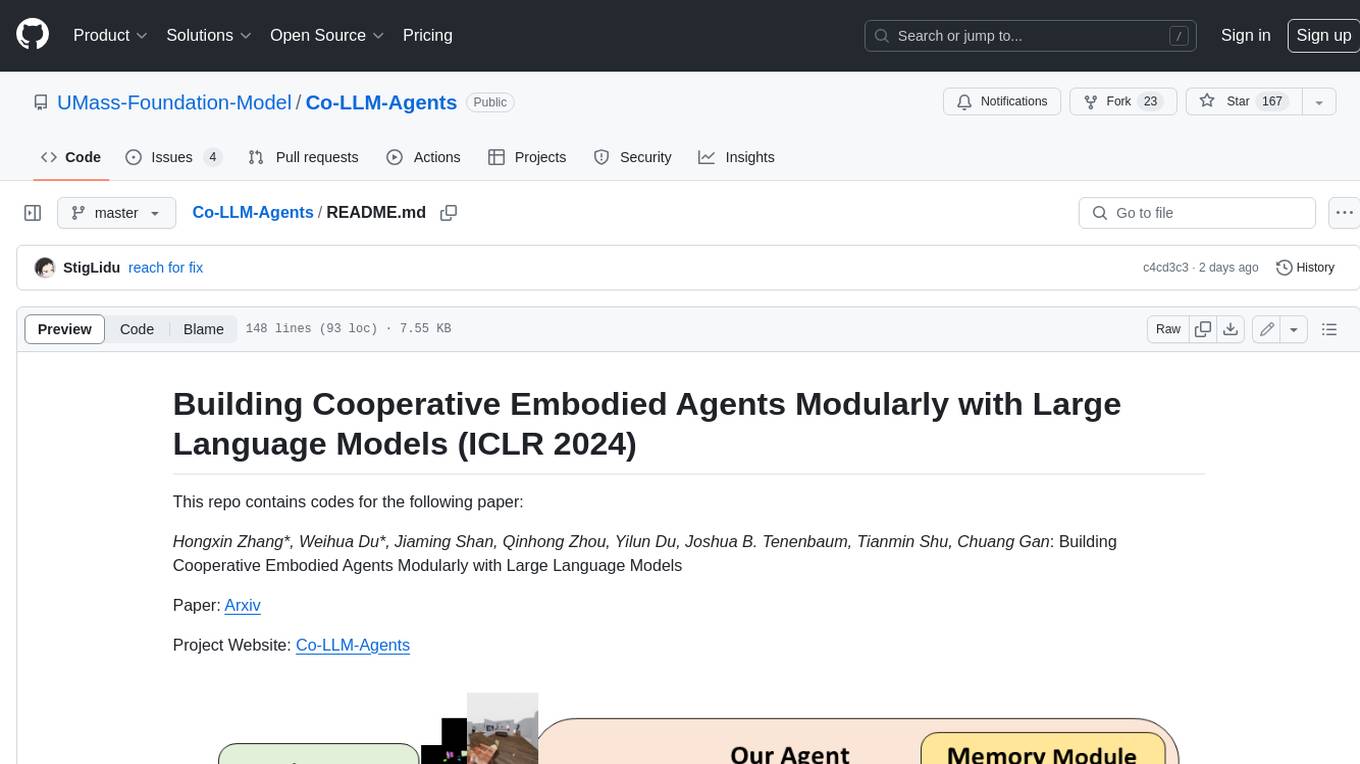
Co-LLM-Agents
This repository contains code for building cooperative embodied agents modularly with large language models. The agents are trained to perform tasks in two different environments: ThreeDWorld Multi-Agent Transport (TDW-MAT) and Communicative Watch-And-Help (C-WAH). TDW-MAT is a multi-agent environment where agents must transport objects to a goal position using containers. C-WAH is an extension of the Watch-And-Help challenge, which enables agents to send messages to each other. The code in this repository can be used to train agents to perform tasks in both of these environments.
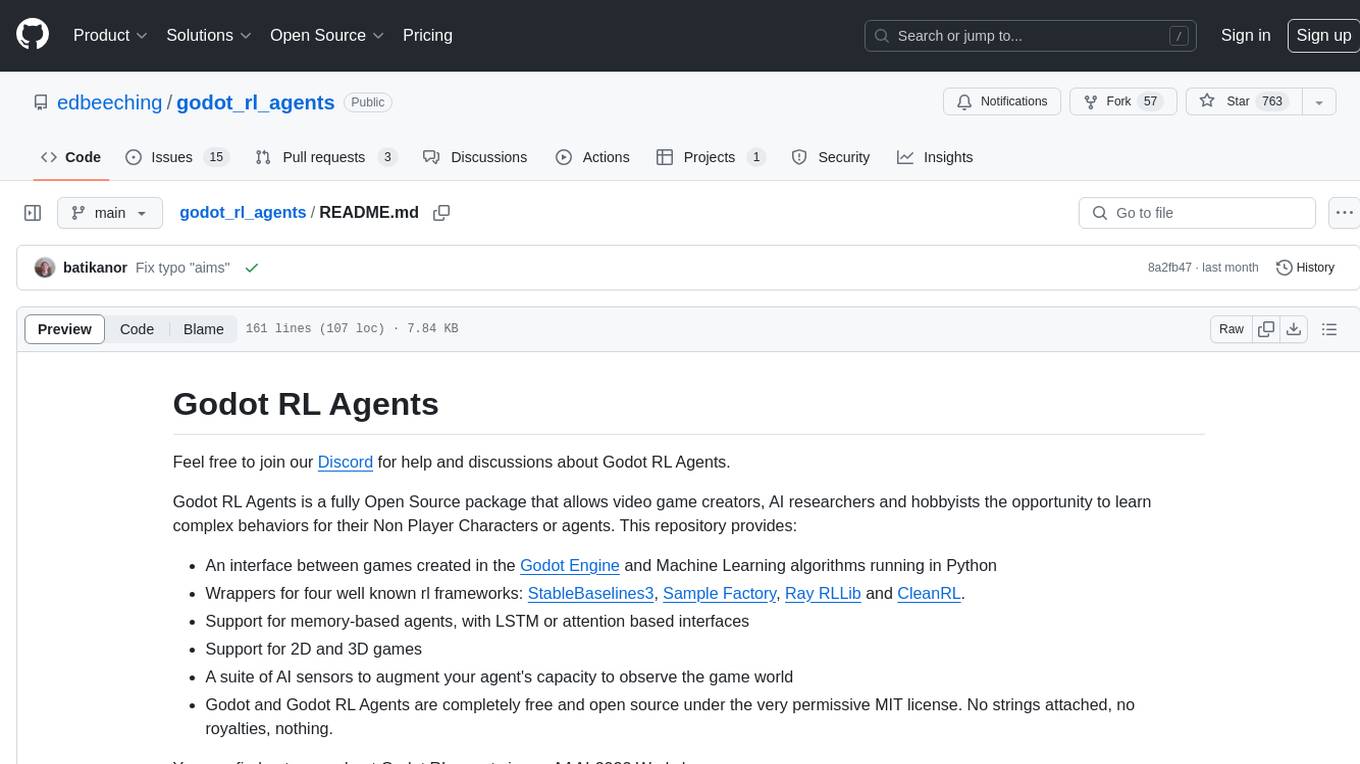
godot_rl_agents
Godot RL Agents is an open-source package that facilitates the integration of Machine Learning algorithms with games created in the Godot Engine. It provides interfaces for popular RL frameworks, support for memory-based agents, 2D and 3D games, AI sensors, and is licensed under MIT. Users can train agents in the Godot editor, create custom environments, export trained agents in ONNX format, and utilize advanced features like different RL training frameworks.
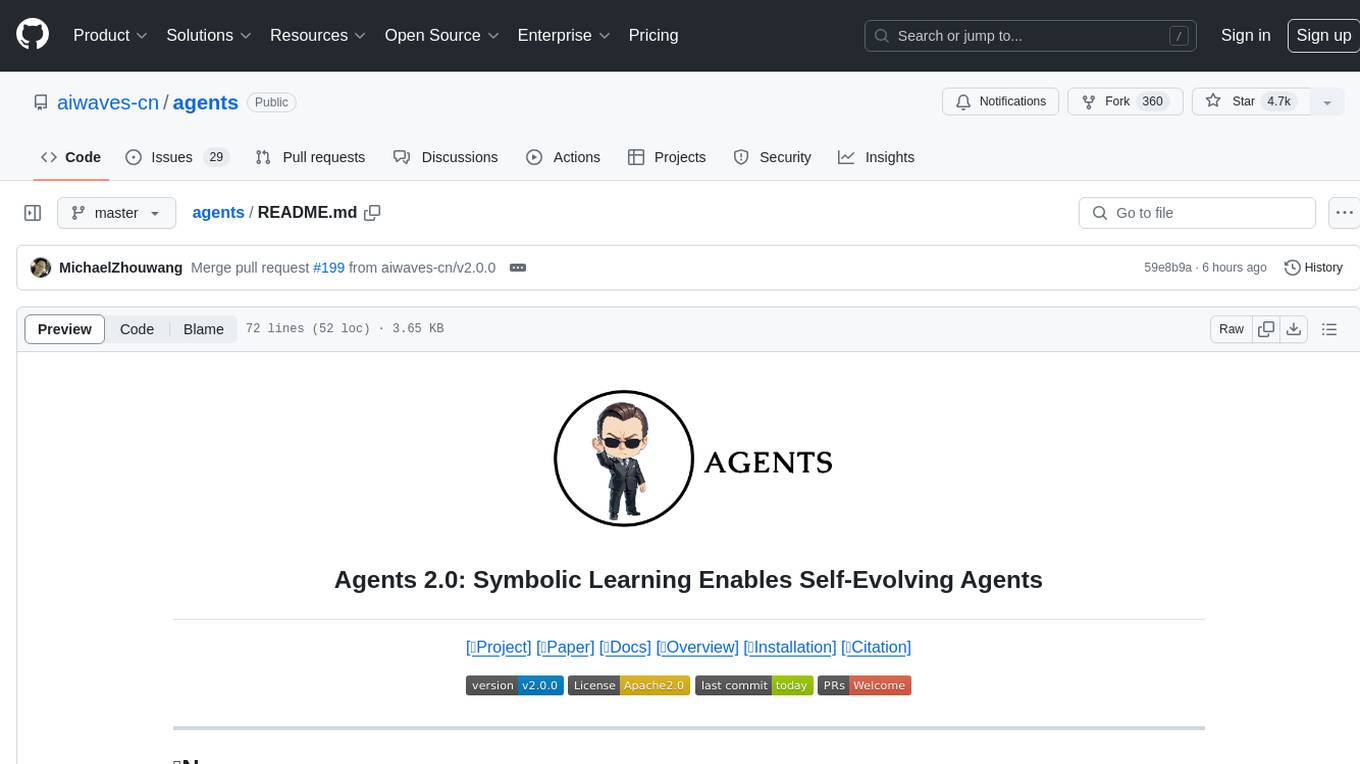
agents
Agents 2.0 is a framework for training language agents using symbolic learning, inspired by connectionist learning for neural nets. It implements main components of connectionist learning like back-propagation and gradient-based weight update in the context of agent training using language-based loss, gradients, and weights. The framework supports optimizing multi-agent systems and allows multiple agents to take actions in one node.
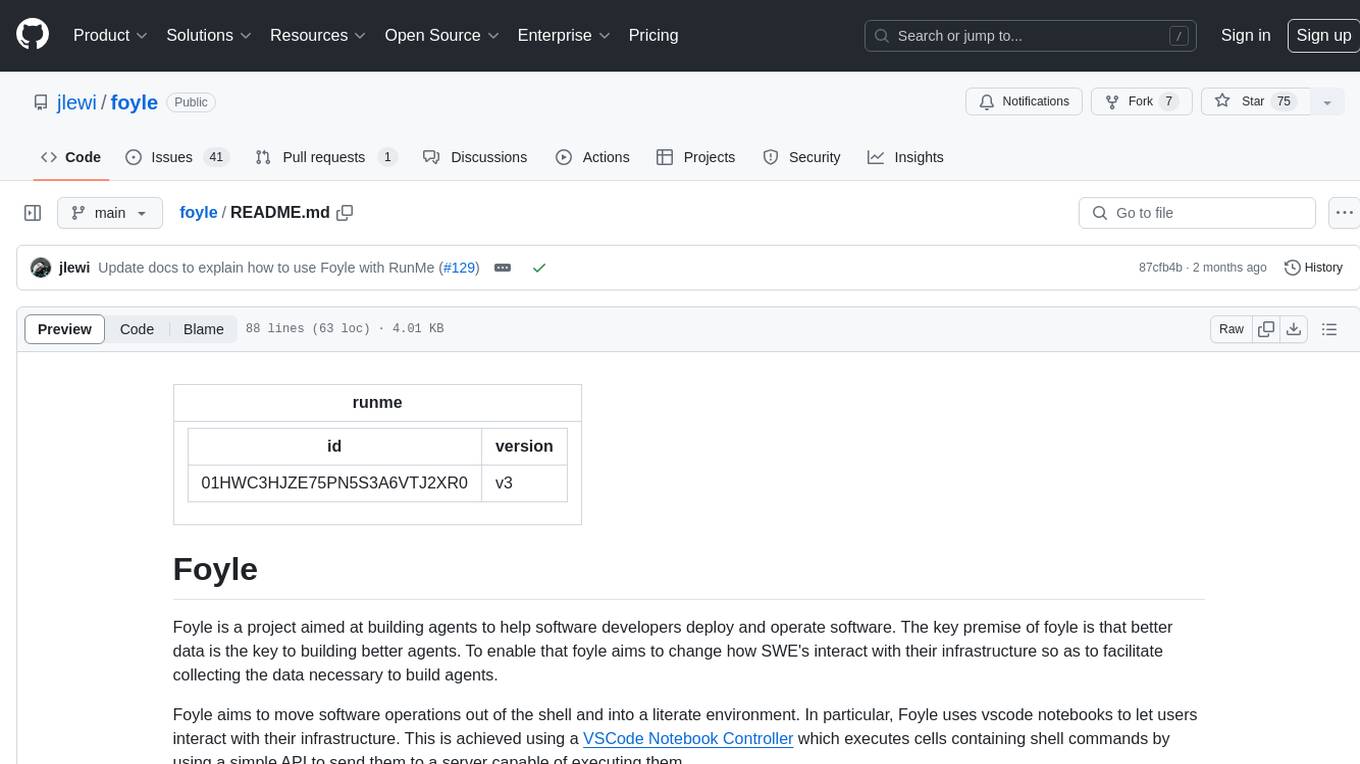
foyle
Foyle is a project focused on building agents to assist software developers in deploying and operating software. It aims to improve agent performance by collecting human feedback on agent suggestions and human examples of reasoning traces. Foyle utilizes a literate environment using vscode notebooks to interact with infrastructure, capturing prompts, AI-provided answers, and user corrections. The goal is to continuously retrain AI to enhance performance. Additionally, Foyle emphasizes the importance of reasoning traces for training agents to work with internal systems, providing a self-documenting process for operations and troubleshooting.
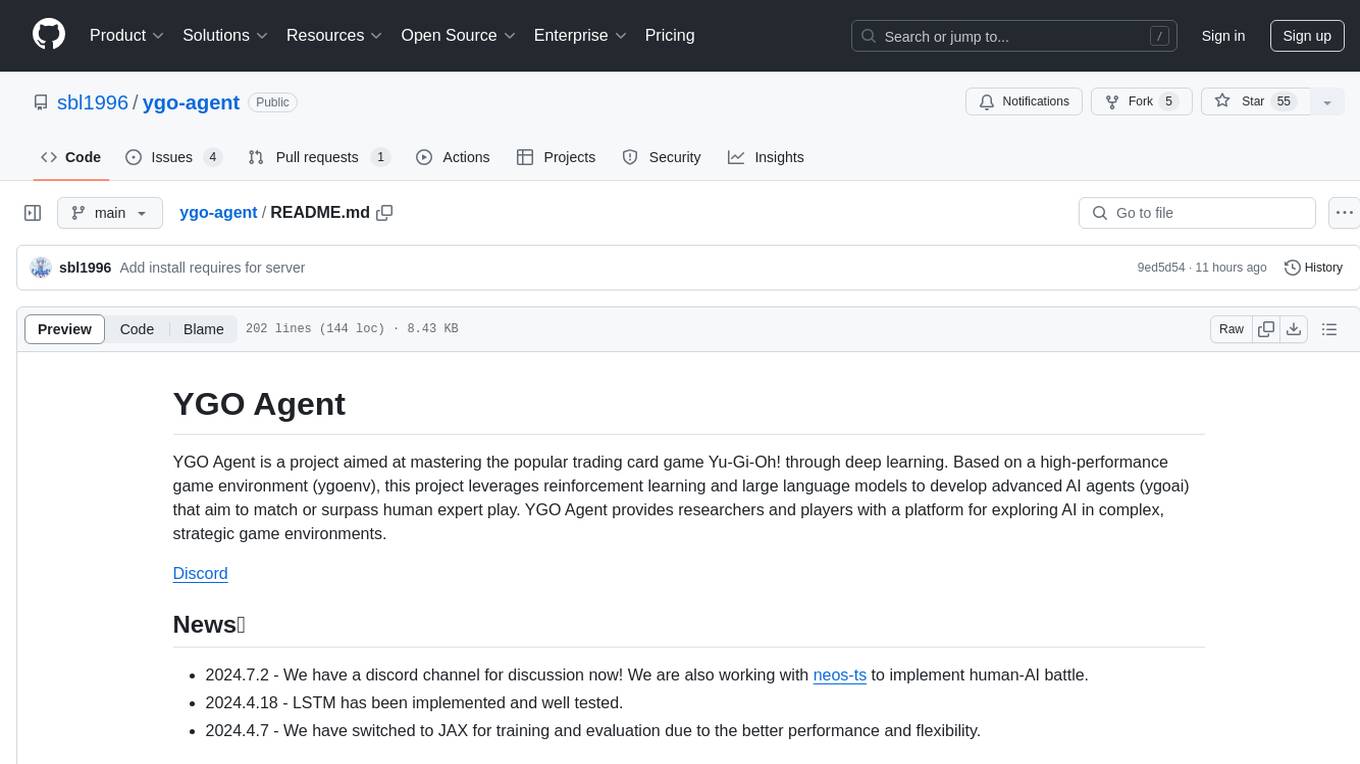
ygo-agent
YGO Agent is a project focused on using deep learning to master the Yu-Gi-Oh! trading card game. It utilizes reinforcement learning and large language models to develop advanced AI agents that aim to surpass human expert play. The project provides a platform for researchers and players to explore AI in complex, strategic game environments.
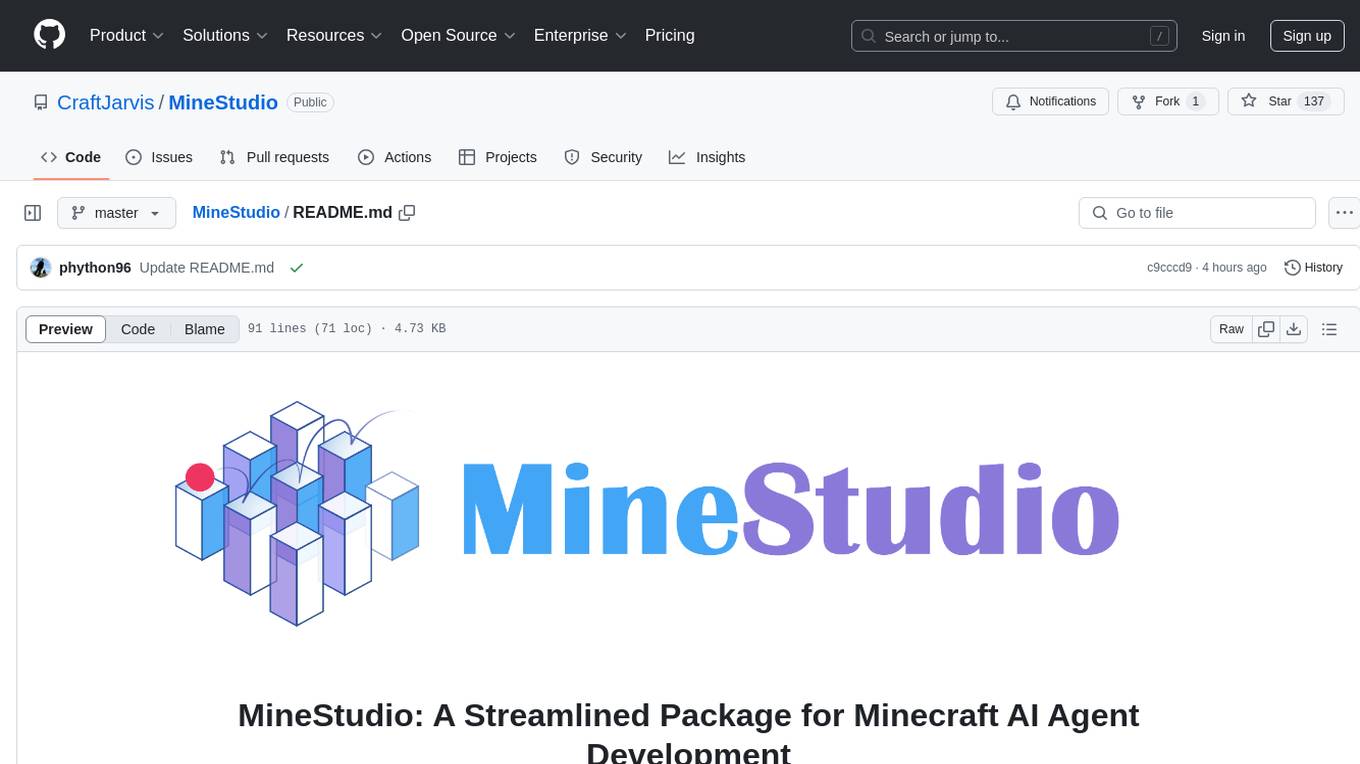
MineStudio
MineStudio is a simple and efficient Minecraft development kit for AI research. It contains tools and APIs for developing Minecraft AI agents, including a customizable simulator, trajectory data structure, policy models, offline and online training pipelines, inference framework, and benchmarking automation. The repository is under development and welcomes contributions and suggestions.
For similar jobs

sweep
Sweep is an AI junior developer that turns bugs and feature requests into code changes. It automatically handles developer experience improvements like adding type hints and improving test coverage.

teams-ai
The Teams AI Library is a software development kit (SDK) that helps developers create bots that can interact with Teams and Microsoft 365 applications. It is built on top of the Bot Framework SDK and simplifies the process of developing bots that interact with Teams' artificial intelligence capabilities. The SDK is available for JavaScript/TypeScript, .NET, and Python.

ai-guide
This guide is dedicated to Large Language Models (LLMs) that you can run on your home computer. It assumes your PC is a lower-end, non-gaming setup.

classifai
Supercharge WordPress Content Workflows and Engagement with Artificial Intelligence. Tap into leading cloud-based services like OpenAI, Microsoft Azure AI, Google Gemini and IBM Watson to augment your WordPress-powered websites. Publish content faster while improving SEO performance and increasing audience engagement. ClassifAI integrates Artificial Intelligence and Machine Learning technologies to lighten your workload and eliminate tedious tasks, giving you more time to create original content that matters.

chatbot-ui
Chatbot UI is an open-source AI chat app that allows users to create and deploy their own AI chatbots. It is easy to use and can be customized to fit any need. Chatbot UI is perfect for businesses, developers, and anyone who wants to create a chatbot.

BricksLLM
BricksLLM is a cloud native AI gateway written in Go. Currently, it provides native support for OpenAI, Anthropic, Azure OpenAI and vLLM. BricksLLM aims to provide enterprise level infrastructure that can power any LLM production use cases. Here are some use cases for BricksLLM: * Set LLM usage limits for users on different pricing tiers * Track LLM usage on a per user and per organization basis * Block or redact requests containing PIIs * Improve LLM reliability with failovers, retries and caching * Distribute API keys with rate limits and cost limits for internal development/production use cases * Distribute API keys with rate limits and cost limits for students

uAgents
uAgents is a Python library developed by Fetch.ai that allows for the creation of autonomous AI agents. These agents can perform various tasks on a schedule or take action on various events. uAgents are easy to create and manage, and they are connected to a fast-growing network of other uAgents. They are also secure, with cryptographically secured messages and wallets.

griptape
Griptape is a modular Python framework for building AI-powered applications that securely connect to your enterprise data and APIs. It offers developers the ability to maintain control and flexibility at every step. Griptape's core components include Structures (Agents, Pipelines, and Workflows), Tasks, Tools, Memory (Conversation Memory, Task Memory, and Meta Memory), Drivers (Prompt and Embedding Drivers, Vector Store Drivers, Image Generation Drivers, Image Query Drivers, SQL Drivers, Web Scraper Drivers, and Conversation Memory Drivers), Engines (Query Engines, Extraction Engines, Summary Engines, Image Generation Engines, and Image Query Engines), and additional components (Rulesets, Loaders, Artifacts, Chunkers, and Tokenizers). Griptape enables developers to create AI-powered applications with ease and efficiency.


